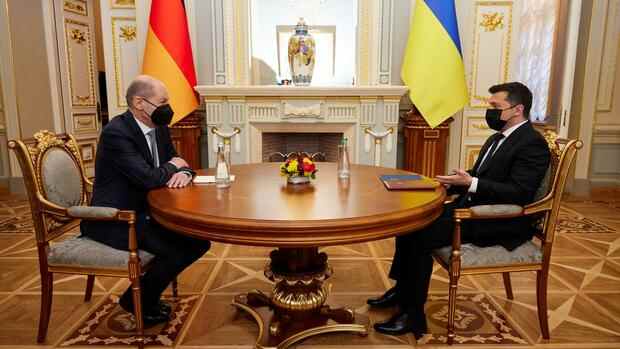Berlin It is Chancellor Olaf Scholz’s (SPD) most difficult journey to date: war is threatening in the middle of Europe – and Scholz assured Ukraine of his support during his visit to Kiev on Monday. “Germany stands firmly by your side,” he said at a joint press conference with Ukrainian President Volodymyr Zelenskiy.
In the event of a Russian invasion of Ukraine, Scholz announced “far-reaching and effective sanctions”. This will happen in “coordination with our allies,” said Scholz. The Chancellor again did not say whether the sanctions also include the Nord Stream 2 gas pipeline. “We only see Nord Stream 2 as a threat,” Zelensky said. Germany should campaign for gas transit from Russia through Ukraine, he demanded.
The Ukrainian President basically regretted that he had no information on how concrete the possible sanctions by NATO could be. He emphasized that there are different views on Nord Stream 2 with the federal government.
After Olaf Scholz traveled to the USA last week, travel diplomacy is now entering its second week. The order of the Chancellor’s trips sends a clear political message: first to Kiev, then to Moscow. So first to the threatened Ukrainians, then to the aggressor in Moscow.
Top jobs of the day
Find the best jobs now and
be notified by email.
The expectations of Scholz are high. The Ukrainian President made it clear that his country wanted to become a member of NATO and the European Union. However, the Federal Chancellor emphasized that the question of membership in alliances is currently not pending. Ukraine’s ambassador in London had previously indicated that his country could drop NATO membership to avert war.
More on the Ukraine conflict
Scholz put the amount of support since the Russian occupation of the Crimean peninsula in 2014 at 1.8 billion euros. No country in the world has supported Ukraine as much as Germany in recent years, said the Chancellor in Kiev. He announced an accelerated payment of a further 150 million euros from an ongoing loan.
On the other hand, it remained a strict “no” to arms deliveries. Even if the Ukrainian ambassador reiterated his government’s demands for heavy weapons from Germany shortly before Scholz’s visit. Andriy Melnyk stressed that Ukraine needs 12,000 anti-tank missiles and 1,000 anti-aircraft missiles to defend itself against a Russian attack.
According to Melnyk, Scholz’s trips are “the last chance” for a diplomatic solution to the Ukraine conflict. War is becoming more and more inevitable. His government is preparing for the worst scenario, namely “that the capital could possibly be bombed in the next few days”.
Meanwhile, the Federal Chancellor is continuing to pursue his dual strategy: on the one hand seeking dialogue, on the other hand “to say clearly that military aggression against Ukraine will lead to harsh reactions and sanctions”. These have been carefully prepared together with the allies in Europe and in NATO and could “take effect immediately”. During his visit to Kiev, Scholz stressed that he was ready for a serious dialogue with Russia. However, the territorial integrity of Ukraine is non-negotiable for Germany.
Lavrov: You can’t have endless conversations
At a meeting with President Vladimir Putin that was broadcast on Russian television, Russian Foreign Minister Sergei Lavrov had previously called for dialogue with Western countries to be continued. He noted that the US has offered dialogue on limiting missile deployments in Europe, limiting military exercises and other confidence-building measures.
When asked by Putin whether it made sense to continue diplomatic efforts, Lavrov replied that the possibilities for talks had not yet been exhausted. He suggested continuing negotiations. But it is not possible to have endless conversations, Lavrov continued.
Meanwhile, the Group of Seven industrialized countries (G7) has threatened Russia with severe economic and financial sanctions if it attacks Ukraine. The G7 countries are ready to jointly impose sanctions that would have “massive and immediate effects on the Russian economy,” said a statement by the G7 finance ministers published on Monday.
G7 threaten Russia with economic sanctions
However, the top priority of the G7 is still to support efforts to de-escalate the Ukraine crisis, emphasized the ministers. In the event of a Russian military action, however, the G7 is ready to take the consequences.
At the end of the press conference with the Chancellor, Zelensky stressed that his family would stay in Kiev. There are no plans to bring them to western Ukraine or out of the country. Selenski also justified the decision with the role model function that the presidential family has for the population.
More: Why the US is reluctant to take the most effective measure in its struggle with Putin
